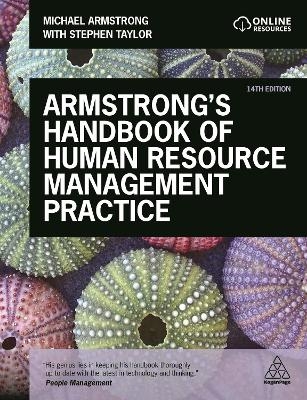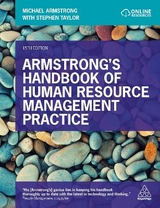
Armstrong's Handbook of Human Resource Management Practice
Kogan Page Ltd (Verlag)
978-0-7494-7411-9 (ISBN)
- Titel erscheint in neuer Auflage
- Artikel merken
The bestselling, definitive text for all human resource management students and professionals.
Providing a complete resource for understanding and implementing HR in relation to the needs of the business as a whole, this book contains in-depth coverage of all the key areas essential to the HR function such as employment law, employee relations, learning and development, performance and reward. Accessible and to the point as ever, this fully updated 14th edition includes emerging theory and practice, embracing the most current thinking on engagement, talent management and leadership development. With updated case studies and references to academic journals, professional magazines and recent research and surveys, it also includes coverage of new approaches to topics such as job evaluation and pay structures.
Armstrong's Handbook of Human Resource Management Practice is aligned with the Chartered Institute of Personnel and Development (CIPD) professional map and standards, with the sections meeting CIPD learning outcomes now even clearer than before. Comprehensive online support material for instructors, students and HR managers are included. Resources for students and professionals include multiple choice questions, flash cards, case studies, further reading and a glossary of HRM terms. The lecturers' manual contains session notes, discussion questions, a literature review and a complete set of lecture slides.
Michael Armstrong is the UK's bestselling author of HRM books. With over a million copies sold, his books have been translated into twenty-one languages. He is managing partner of E-Reward. Prior to this he was a chief examiner of the Chartered Institute of Personnel and Development (CIPD). Stephen Taylor is a senior lecturer in Human Resource Management at the University of Exeter Business School and a chief examiner for the CIPD. Before his academic career he worked in a variety of management roles in the hotel industry and in the NHS.
Chapter - 20: Commitment;
Chapter - 21: Employee Engagement;
Section - SIX: People Resourcing;
Chapter - 22: Strategic Resourcing;
Chapter - 23: Workforce Planning;
Chapter - 24: Recruitment and Selection;
Chapter - 25: Talent Management;
Chapter - 26: Introduction to the Organization;
Chapter - 27: Release from the Organization;
Chapter - 28: Managing Employee Retention;
Chapter - 29: Absence Management;
Chapter - 30: Managing Diversity and Inclusion;
Chapter - 31: Managing Flexibility;
Section - SEVEN: Learning and Development;
Chapter - 32: Strategic Learning and Development;
Chapter - 33: How People Learn;
Chapter - 34: The Process of Learning and Development;
Chapter - 35: Workplace Learning;
Chapter - 36: Social Learning;
Chapter - 37: E-Learning;
Chapter - 38: Training;
Chapter - 39: Leadership and Management Development;
Chapter - 40: The Role of the Learning and Development Function;
Section - EIGHT: Performance Management;
Chapter - 41: Performance Management Fundamentals;
Chapter - 42: The Process of Performance Management;
Section - NINE: Rewarding People;
Chapter - 43: Reward Management;
Chapter - 44: Market Pricing;
Chapter - 45: Job Evaluation;
Chapter - 46: Grade and Pay Structures;
Chapter - 47: Contingent Pay;
Chapter - 48: Managing Reward for Special Groups;
Chapter - 19: Motivation;
Section - FIVE: Factors Influencing Employee Behaviour;
Chapter - 18: Organization Development;
Chapter - 17: Work, Organization and Job Design;
Chapter - 16: Organizational Behaviour;
Section - FOUR: People and Organizations;
Chapter - 15: Corporate Social Responsibility;
Chapter - 14: The Ethical Dimension of HRM;
Chapter - 13: Competency-Based HRM;
Chapter - 12: Knowledge Management;
Chapter - 11: HR Analytics;
Chapter - 10: HR Procedures;
Chapter - 09: HR Policies;
Chapter - 08: HR Strategies;
Section - THREE: Human Resource Management Processes;
Chapter - 07: HRM and Performance;
Chapter - 06: The Role of HR Professionals;
Chapter - 05: The Role of the HR Function;
Chapter - 04: HR Architecture – The HR System;
Section - TWO: Delivering HRM;
Chapter - 03: Strategic HRM;
Chapter - 02: Human Capital Management;
Chapter - 01: Human Resource Management (HRM);
Section - ONE: Fundamentals of Human Resource Management
Chapter - 49: Managing Reward Systems;
Section - TEN: Employee Relations;
Chapter - 50: The Basis of Employee Relations;
Chapter - 51: The Employment Relationship;
Chapter - 52: The Psychological Contract;
Chapter - 53: The Practice of Industrial Relations;
Chapter - 54: Employee Voice;
Chapter - 55: Employee Communications;
Section - ELEVEN: Employee Well-Being;
Chapter - 56: The Practice of Employee Well-Being;
Chapter - 57: Health and Safety;
Section - TWELVE: International HRM;
Chapter - 58: The International HRM Framework;
Chapter - 59: The Practice of International HRM;
Chapter - 60: Managing Expatriates;
Section - THIRTEEN: HRM Practices;
Chapter - 61: HR Information Systems;
Chapter - 62: Employment Law;
Section - FOURTEEN: HR Skills;
Chapter - 63: Strategic HRM Skills;
Chapter - 64: Business Skills;
Chapter - 65: Problem-Solving Skills;
Chapter - 66: Analytical and Critical Skills;
Chapter - 67: Research Skills;
Chapter - 68: Statistical Skills;
Chapter - 69: Selection Interviewing Skills;
Chapter - 70: Job, Role and Skills Analysis and Competency Modelling;
Chapter - 71: Learning and Development Skills;
Chapter - 72: Negotiating Skills;
Chapter - 73: Leading and Facilitating Change;
Chapter - 74: Leadership Skills;
Chapter - 75: Influencing Skills;
Chapter - 76: Handling People Problems;
Chapter - 77: Handling Challenging Conversations;
Chapter - 78: Managing Conflict;
Chapter - 79: Political Skills;
Chapter - 80: Investigating a Business Issue from an HR Perspective
| Erscheinungsdatum | 17.01.2017 |
|---|---|
| Verlagsort | London |
| Sprache | englisch |
| Maße | 190 x 250 mm |
| Gewicht | 1290 g |
| Themenwelt | Wirtschaft ► Betriebswirtschaft / Management ► Personalwesen |
| ISBN-10 | 0-7494-7411-4 / 0749474114 |
| ISBN-13 | 978-0-7494-7411-9 / 9780749474119 |
| Zustand | Neuware |
| Haben Sie eine Frage zum Produkt? |
aus dem Bereich



